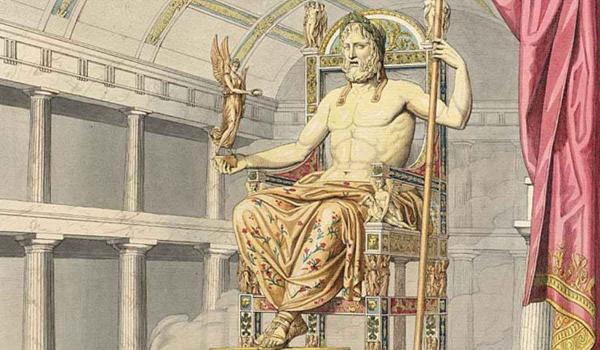The Olympian Gods and Goddesses (Their Names & Powers)


In ancient Greek mythology, 12 gods and goddesses ruled the universe from atop Greece's Mount Olympus, as the Olympic Pantheon. These powerful beings were revered and worshipped by the ancient Greeks, and their epic stories continue to captivate people to this day.
Our main sources on the gods include Hesiod's “Theogony” [1] and the “Homeric Hymns” [2], the latter of which is now regarded as a largely anonymous collection of works, rather than being penned by the same Homer who wrote the “Odyssey “ and the “Iliad”).
The Origin of the Gods
According to myth, the Olympians were the children of the Titans Cronus and Rhea. When Cronos (or Kronos) took over control of the universe by castrating his father Uranus, he feared that his own children would one day overthrow him. To prevent this, he consumed each of his children as they were born. However, Rhea was able to save her youngest son, Zeus, by tricking Cronus into swallowing a rock wrapped in swaddling clothes.
After Zeus grew to adulthood, he led a rebellion against Cronus and the Titans. With the help of his siblings and other powerful beings, he was able to overthrow the Titans and establish the Olympian gods and goddesses as the new rulers of the universe.
All the Olympians are related to one another; their various relationships are themselves the subject of many Greek myths. The Romans adopted most of these Greek gods and goddesses, but with new names. There were many more deities in the Roman and Greek pantheons, but we've included some of the more prominent Greek deities below, in addition to the main Olympians.
Note: "Olympian" refers to the divine residents of Olympus. "Olympic" refers to things pertaining to the city of Olympia, or the Olympic Games that were held there (as well as the modern Olympic Games).
How Many Greek Gods Are There?
Greek mythology is filled with countless gods and goddesses, each with their own unique stories and attributes. Overall, the total number of Greek gods and goddesses is difficult to determine since there are many variations and interpretations of Greek mythology. However, the stories and legends surrounding these divine beings continue to captivate and inspire people around the world.
However, there are twelve major Olympian gods and goddesses that are most commonly recognized in Greek mythology. These 12 are considered the most powerful and are believed to reside on Mount Olympus.
So, what are the 12 main Greek gods called? We’re glad you asked — and we have the answers below.
- Zeus.
- Hera.
- Poseidon.
- Hades.
- Aphrodite.
- Apollo.
- Ares.
- Artemis.
- Athena.
- Hephaestus.
- Hestia.
- Hermes.
In addition to the 12 Olympians, there are also many other gods and goddesses in Greek mythology. Some of these are no longer well known or lost to the mists of time, while others were regional deities or have specific domains. And though the number of Greek gods and goddesses can be difficult to determine, it is safe to say that there are many of them, responsible for every aspect of daily life for the ancient Greeks.
The Olympians
The Olympian gods and goddesses in Greek mythology were often depicted in art and literature, and their stories have been passed down through generations. Many of these stories have become cultural touchstones and continue to influence modern art, literature, and popular culture.
From the epic adventures of the hero Heracles to the tragic love story of Orpheus and Eurydice, the tales of Greek mythology continue to fascinate and inspire people of all ages and backgrounds — especially the parts that the Olympian gods played in them.
Now, let’s discover the 12 main gods of the Greek Pantheon!
Zeus (King of the Gods, Sky, and Thunder)
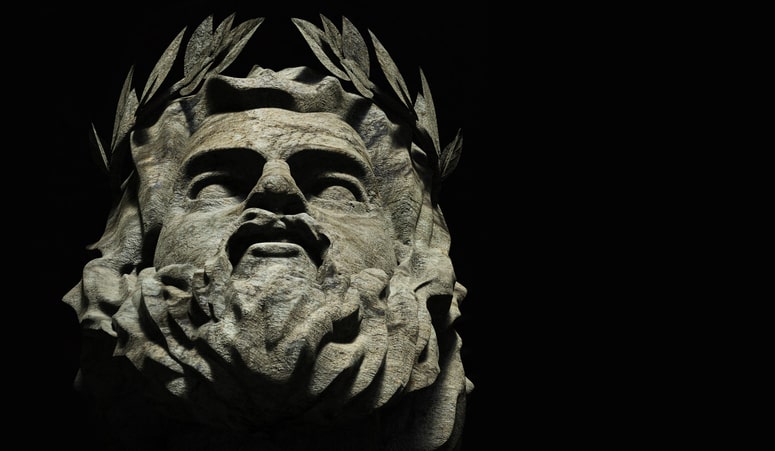
Roman Name: Jupiter
The most powerful of all, Zeus was the king of the gods in Greek mythology and was associated with the sky and thunder. He was often depicted as a powerful and imposing figure, wielding a thunderbolt as his weapon. As the Olympic ruler, Zeus was responsible for maintaining order and justice in the universe. He was also known for his numerous romantic escapades away from his wife, Hera, and was often portrayed as a philanderer. Despite his flaws, Zeus was revered as one of the most important gods in Greek mythology and played a prominent role in many of the most famous stories and legends.
See also: The Reign of Thunder and Lightning: Olympus Under Zeus.
Hera (Queen of the Gods, Marriage, and Childbirth)
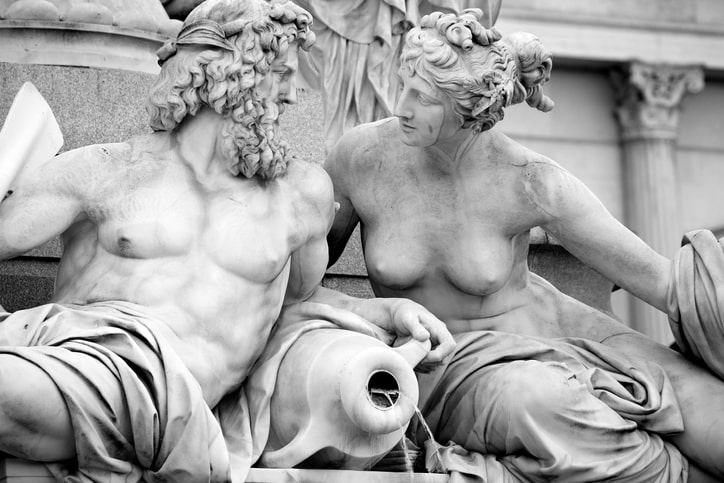
Roman Name: Juno
Hera was the queen of Olympus in Greek mythology and was associated with marriage and childbirth. She was often depicted as a regal and powerful figure and was known for her jealousy and vengeful nature, particularly towards her husband Zeus' numerous romantic interests. Despite this, she was also revered as a protector of women and was often called upon for assistance during childbirth. With a complex personality, Hera played a prominent role in many stories and legends, and many myths tell of how she sought revenge when Zeus betrayed her with his lovers. Her symbols include the peacock and the cow.
See also: A Heavenly Marriage? Hera and Zeus.
Poseidon (God of the Sea, Earthquakes, and Horses)
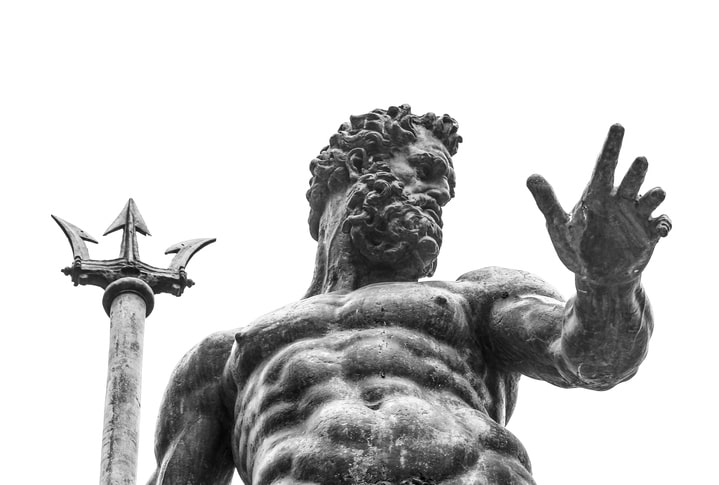
Roman Name: Neptune
Poseidon was primarily the god of the sea in Greek mythology. He was often depicted as a bearded and muscular figure, riding a chariot pulled by horses. Poseidon was known for his volatile temperament and was often associated with storms and natural disasters, such as earthquakes and tsunamis. Despite his temper, he was also revered as a protector of sailors and was often called upon for assistance during sea voyages. The sea god features prominently in stories about the Trojan War, due to a grudge he bore against the former king Laomedon of Troy. He is also the father of Polyphemus, the cyclops in the “Odyssey”, and of the demigod Triton, and his symbols include the horse and the trident (a three-pronged pitchfork).
See also: The Brothers of Zeus: Poseidon and Hades.
Hades (God of the Underworld and Wealth)
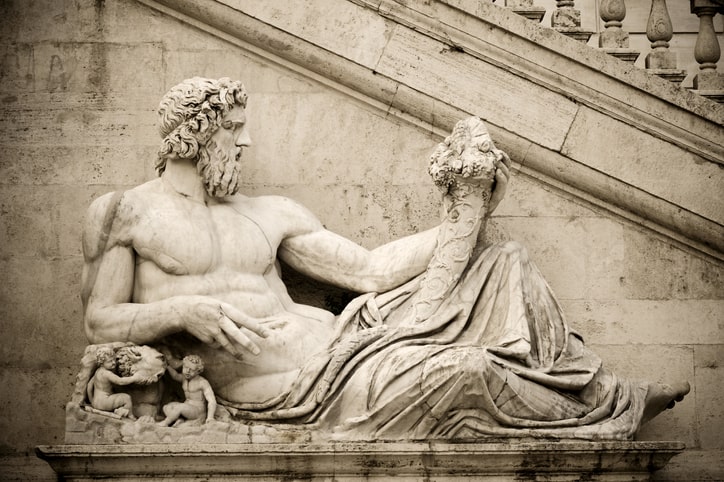
Roman Name: Pluto
Hades was the god of the underworld, also known as the realm of the dead, and ruled over those who resided there. His name is often used interchangeably as that of the Greek underworld. Hades was often depicted as being stern and unyielding, and was feared by mortals and gods alike. Hades was the brother of Zeus and Poseidon, and was married to Persephone, goddess of the underworld and vegetation. In some versions of Greek mythology, Hades was also known as Plouton, which means "wealthy one," and was associated with riches and precious metals found underground.
See also: The Brothers of Zeus: Poseidon and Hades.
Aphrodite (Goddess of Love, Beauty, and Sexuality)
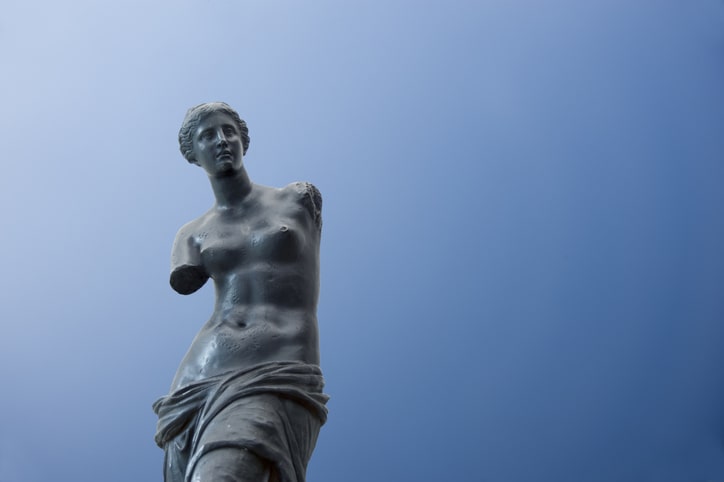
Roman Name: Venus
Aphrodite was a protector of sailors and the Greek goddess of love, beauty, and sexuality. According to mythology, she was born from the sea foam that formed after the god Uranus was castrated and his genitals were thrown into the sea by his son Cronus. Although Aphrodite was married to the god Hephaestus, she had many affairs with other gods and mortals, including Ares, the god of war. She was often depicted as a beautiful woman, and her symbols included roses, myrtle trees, doves, and seashells.
See also: Aphrodite.
Apollo (God of Poetry, Music, Healing, Plague, and Prophecy)
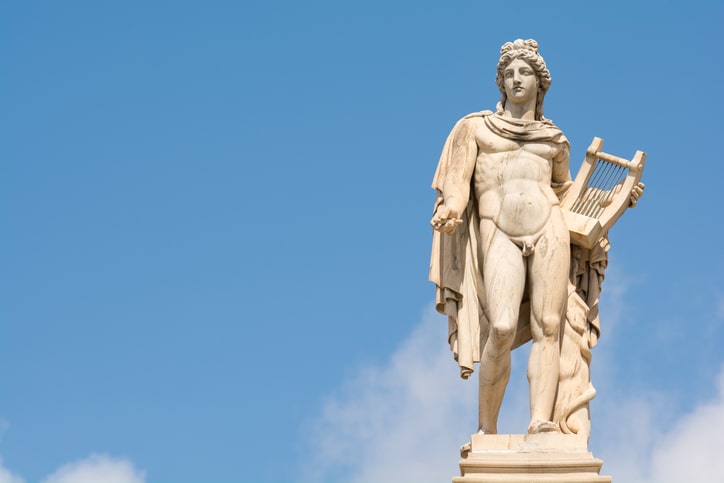
Roman Name: Phoebus
The son of Zeus and the Titan Leto, and twin brother of Artemis, Apollo was the god of music and poetry, as well as healing and plague — he could both cure epidemics and cause sickness to spread with his arrows of plague. He was often depicted as a skilled archer, lyre player, and associated with light and truth. Apollo was also known for his beauty and was often portrayed as youthful and handsome, and was seen as a benevolent and inspiring deity. His symbols include the lyre, laurel tree, crow, and dolphin. Apollo was famously the patron of the oracle at Delphi, and his influence can be seen in many aspects of ancient Greek culture, along with his twin sister, Artemis.
Fun Fact: while Apollo eventually became associated with the god of the sun, Helios was the actual deity in charge of propelling the sun across the sky in his golden chariot.
See also: Night of the Hunters: Artemis and Apollo.
Ares (God of War and Violence)
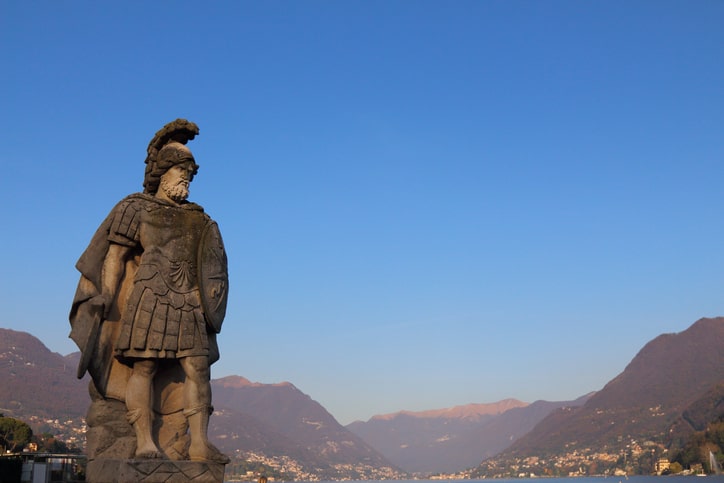
Roman Name: Mars
Ares was the god of war. He was depicted as both cruel and a coward, but greatly feared among the Greek populace for his battle lust and violence. Despite his reputation for violence, Ares was not always respected by the other gods and was often the subject of ridicule and scorn. Ares was the son of Zeus and Hera, but neither of his parents liked him which often made him feel outcast by the Olympians, apart from Aphrodite, with whom he carried on a lengthy affair. His symbols include the vulture and the dog, and he often carried a bloody spear.
See also: Hephaestus and Ares.
Artemis (Goddess of the Moon, the Hunt, Wilderness, Childbirth, and Virginity)
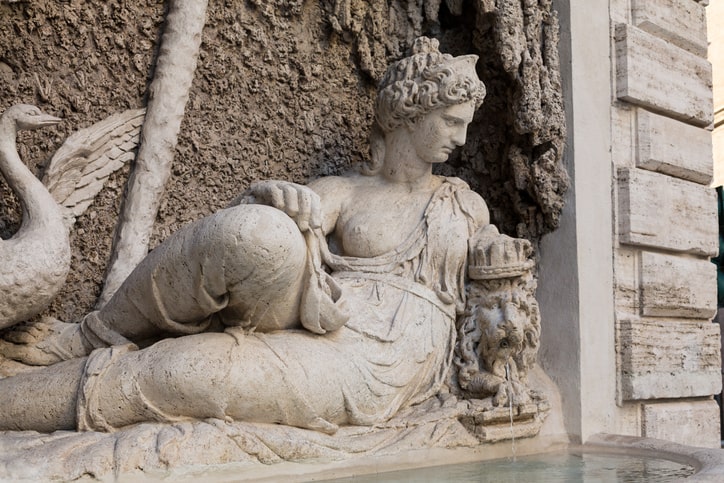
Roman Name: Diana
Artemis is the goddess of the hunt, wilderness, childbirth, and virginity. She is often depicted as a young woman with a bow and arrows, accompanied by a hunting dog or deer. Skilled at archery, she hunted with silver arrows and loved all wild animals with a fierce passion. Artemis was the daughter of Zeus and Leto, and was the twin sister of Apollo. Her symbols include the cypress tree and the deer, and she refused to relinquish her virginal state, though pursued by many men and gods alike. Artemis was highly respected by the ancient Greeks and was considered a protector of young women and animals. She was sometimes called the "Lady of the Wild Things."
See also: Night of the Hunters: Artemis and Apollo.
Athena (Goddess of Wisdom, War, and Crafts)
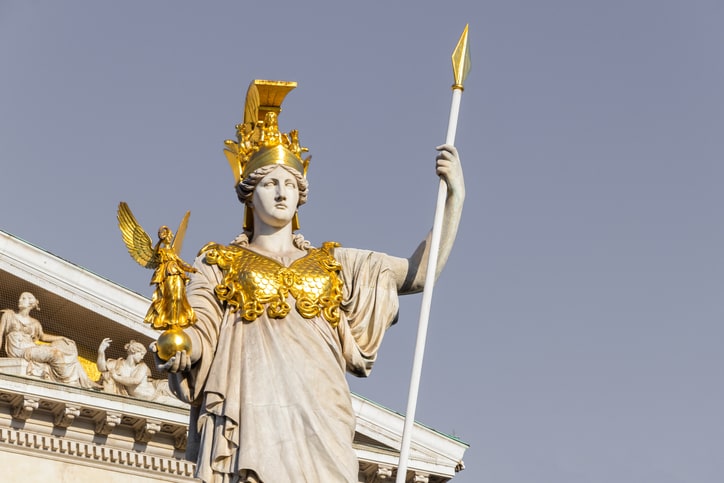
Roman Name: Minerva
Pallas Athena was a major figure in Greek mythology, known not only for her wisdom, war prowess, and skill in crafts but also for her role as a protector of the people of Athens. Her iconic image, with helmet, shield, and spear, has been preserved in numerous works of art throughout history. But Athena was not just a warrior goddess; she was also renowned for her intelligence and strategic thinking, which often allowed her to outmaneuver her opponents. She was skilled in the art of war and battle strategy, differentiating her from Ares and his bloodlust for combat, and often helped heroes such as Odysseus, and Heracles. According to myth, Athena sprang full-grown from the forehead of Zeus and became his favorite child. Her symbols include the owl and the olive tree, and she is also the namesake of the city of Athens.
See also: First in War, First in Peace: Athena.
Hephaestus (God of Fire, Metalworking, and Crafts)
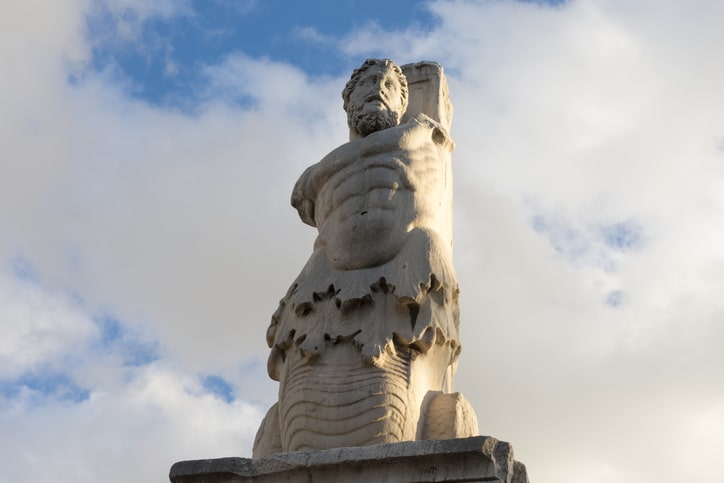
Roman Name: Vulcan
Hephaestus was known for his exceptional skill as a blacksmith and was responsible for creating many of the weapons and tools used by the gods. Despite being physically weak and unattractive, according to many myths, Hephaestus was highly respected by the other gods for his talents and was often called upon to create intricate and complex works of art. He was also associated with volcanoes and was said to have his forge located underneath a volcano. Hephaestus was the son of Zeus and Hera, and was married to Aphrodite — though his union with that goddess was fraught with scandal due to her ongoing affair with Ares. His symbols include the anvil and the forge.
See also: Hephaestus and Ares.
Hestia (Goddess of the Home, Hearth, and Hospitality)
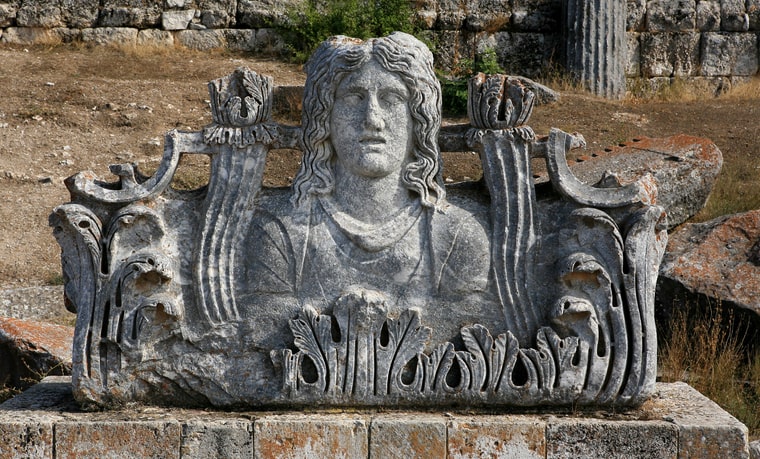
Roman Name: Vesta
Hestia was the goddess of the hearth and home, and was often depicted as a gentle and nurturing figure. She was associated with the warmth and comfort of the house, and was responsible for maintaining the sacred fire in the hearth of every household. Hestia was highly respected by the other gods and goddesses, and was often invoked at the beginning of important events and ceremonies. Despite being one of the major Olympian gods, Hestia did not have many myths or stories associated with her, and was often overshadowed by her more well-known siblings. Hestia was the sister of Zeus and the oldest of the Olympians, and fire is among her symbols.
See also: Home and Harvest: The Sisters of Hera.
Hermes (God of Commerce, Thieves, Travelers, and Athletes)
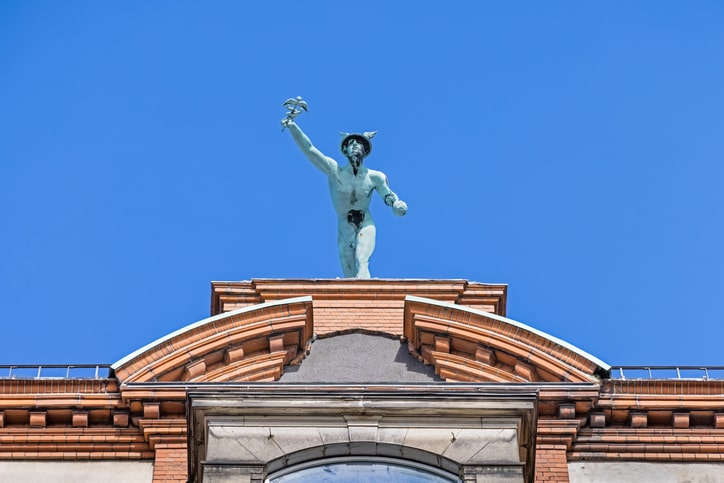
Roman Name: Mercury
Hermes was the messenger of the gods, a trickster, and a friend to thieves. He was said to have invented boxing and gymnastics and was the son of Zeus and the constellation Maia. He was often depicted as a young man wearing a winged hat and sandals, and carrying a caduceus: a staff with two snakes coiled around it. Hermes was known for his quick wit, cunning, and ability to move swiftly between the mortal and divine worlds. He was also considered the messenger of the gods, and was responsible for delivering missives and guiding souls to the underworld. In addition, Hermes was associated with luck and good fortune, and was often invoked by merchants and traders for success in their endeavors. Hermes was also known to be one of the most mischievous of the gods, often playing tricks and pranks on other Olympians, demigods like Heracles, and the mere mortals of Greece.
See also: The Little Rascal: Hermes.
Demeter (Goddess of Agriculture and Fertility)
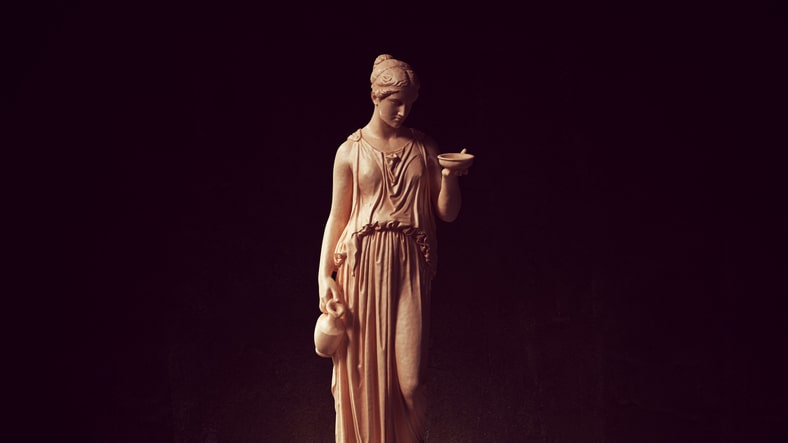
Roman Name: Ceres
Demeter was the goddess of agriculture and was the sister of Zeus. She was often depicted holding a sheaf of wheat or a cornucopia, and was associated with the harvest and the growth of crops. Demeter was also revered as a maternal figure, and was often invoked for blessings of fertility and abundance. She was said to have created the seasons through her grief over the loss of her daughter Persephone, who was abducted by Hades and taken to the underworld for six months of the year. Demeter's sorrow caused the earth to become barren, and her joy at being reunited with her daughter brought about the return of spring and the renewal of life.
Fun Fact: The word “cereal” comes from her Roman name.
See also: Home and Harvest: The Sisters of Hera.
Dionysus (God of Wine, Pleasure, Festivities, and Theater)
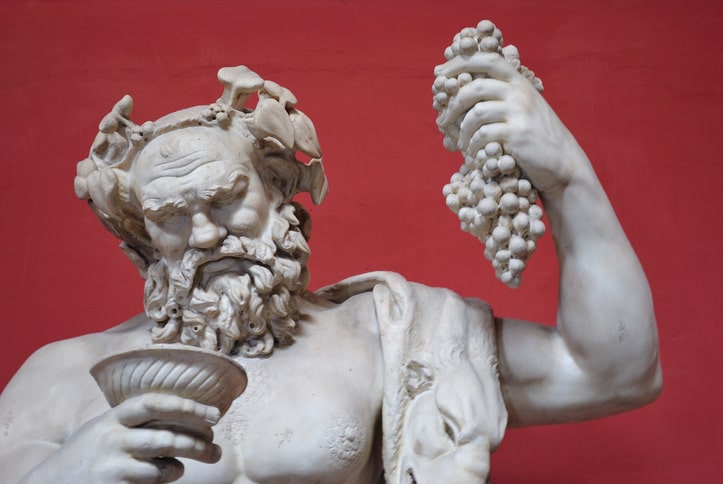
Roman Name: Bacchus
Dionysus was the god of wine, which he invented. In ancient Greece, Dionysus was honored with springtime festivals that centered on theater called the Dionysia. It was held every March in Athens, and playwrights showcased new tragic, comedic, and satyrical dramas in the diety’s honor. Dionysus was the son of Zeus and Semele, a mortal. His symbols include ivy, the snake, and grapes — particularly if they could be used to make wine. He is commonly depicted in the company of satyrs.
Dionysus was also associated with fertility, theater, and religious ecstasy. Dionysus was often depicted holding a thyrsus, a type of staff topped with a pine cone, and accompanied by wild animals such as panthers and tigers. He was known for his wild and chaotic behavior, and was said to have the power to drive people to madness or ecstasy. Dionysus was also associated with rebirth and transformation, and was often invoked during rites of passage and initiation ceremonies.
See also: Eat, Drink, and Be Merry: Dionysus.
The Lesser Olympians

In addition to these 12 Olympian gods and goddesses, there are many other gods and goddesses in Greek mythology, including lesser-known deities and regional gods, or even Olympians that don’t have many specific powers. Often, these deities are the children of the 12 Olympians, either by each other, by lesser gods, or by mortal women.
Gods of this level include the following deities, from god to demigod to hero. Fun fact: in classical literature, the term demigod was basically unknown. Instead, hero and half-god were largely interchangeable. And, as in the case of Heracles, a hero could eventually be elevated to full godhood.
Aeolus (God of the Wind)
Roman Name: Aiolos
In ancient Greek tales, Aeolus was the son of Poseidon and Arne, and was the lord of the winds — particularly the destructive storm winds that he kept sequestered away safely. Responsible for controlling the winds and storms, he was often depicted as a bearded man holding a scepter or a key. In some versions of the myth, Aeolus was also the king of the floating island of Aeolia, where he welcomed Odysseus and his crew during their travels. Overall, Aeolus was a powerful and important figure in Greek mythology, playing a crucial role in controlling the natural world.
Asclepius (God of Healing and Medicine)
Roman Name: Aesculapius
A godly healer, Asclepius was the son of Apollo and the mortal Coronis, and was often depicted with a serpent-entwined staff which has become a symbol of medicine today in the healthcare field. Asclepius was said to have the power to heal the sick and bring the dead back to life, which made him a popular figure in Greek mythology. However, his power was seen as a challenge to the authority of the gods, and he was eventually punished for his actions. Despite this, Asclepius remains an important figure in the history of medicine and healing.
Deimos (God of Terror and Dread)
Roman Name: Metus (male) or Formido (Female)
Deimos was the son of Ares, the god of war, and Aphrodite, the goddess of love and beauty. In Greek mythology, Deimos and his brother Phobos were often depicted as companions of their father, accompanying him into battle to strike fear into the hearts of their enemies. Deimos was typically portrayed as a small, winged figure with a fierce expression, armed with a sword or spear.
Hebe (Goddess of Youth)
Roman Name: Juventas
Hebe was the goddess of youth and the cupbearer of the gods. The daughter of two principal Olympians, Zeus and Hera, she was known for her beauty and grace. Hebe was often depicted as a young woman holding a cup or pitcher, and was responsible for serving nectar and ambrosia to the gods on Mount Olympus.
Heracles (Demigod)
Roman Name: Hercules
Heracles, also known as Hercules or Herakles, was one of the most famous heroes in Greek mythology. As the son of Zeus and the mortal Alcmene, Heracles was known for his incredible strength and bravery. His adventures included battling monsters and completing impossible feats like the 12 Labors, which included cleaning the Augean stables in a single day and capturing the three-headed dog Cerberus from the underworld. Despite his incredible abilities, Heracles had a tragic life and was known for his struggles with both personal demons and external enemies.
Pan (God of Nature, Shepherds, and Flocks)
Roman Name: Inuus or Faunus, depending on the god’s primary aspect [3]
The son of Hermes and a nymph, Pan is a lesser-known god in Greek mythology who is associated with nature, shepherds, and flocks. He is often depicted as having the legs and horns of a goat, and he is known for his mischievous and playful nature. Pan was also believed to be a god of music and was often associated with the flute. His presence was thought to bring peace and tranquility to the natural world, and he was often worshipped in rural areas.
Persephone (Goddess of the Underworld and Vegetation)
Roman Name: Proserpina
Persephone was the Greek goddess of the underworld and vegetation, and was the daughter of Zeus and Demeter. She was abducted by Hades to be his queen in the underworld. While in the underworld, Persephone ate six pomegranate seeds, which bound her to Hades and forced her to spend six months of the year in the underworld. This myth became the basis for the changing of the seasons, with Persephone's return to the surface marking the arrival of spring.
Perseus (Demigod)
Roman Name: Perseus
Perseus was a legendary hero in Greek mythology, known for slaying the Gorgon Medusa and rescuing Andromeda from a sea monster. As the son of Zeus and the mortal Danaë, Perseus was a demigod, best known for his bravery and resourcefulness in the face of danger. His story has been passed down through generations as a symbol of courage and perseverance.
The Muses (Goddesses of the Arts and Sciences)
Roman Name: The Muses
Daughters of Zeus and Mnemosyne, the Muses were nine deities who presided over various arts and sciences. They were believed to inspire creativity and artistic endeavors, and were often depicted in art and literature as beautiful, graceful women. Each Muse was associated with a particular art form, such as poetry, music, dance, or history. The nine Muses were Calliope, Clio, Euterpe, Thalia, Melpomene, Terpsichore, Erato, Polyhymnia, and Urania.
The Titans
The Titans were a group of powerful gods in Greek mythology who were said to have ruled during a time known as the Golden Age, prior to the Olympians. They were the children of Gaia and Uranus, the personifications of the earth and the sky, respectively.
Out of the 12 Titans, the most notable include Cronus, the ruler of the Titans who was overthrown by his son Zeus, and his wife Rhea, who was the mother of many of the Olympian gods and goddesses. The remaining Titans were named Hyperion, Oceanus, Coeus, Crius, Iapetus, Theia, Themis, Tethys, Mnemosyne, and Phoebe.
Depending on the source, the god Atlas was either a Titan or one of the Iapetionides (like Prometheus, who gave the gift of fire to mortals). But either way, Atlas is a well-known deity who was condemned to hold up the sky for eternity as punishment for his role in the Titanomachy, the epic battle between the Titans and the Olympian gods for control of the universe.
Other Greek Gods

Finally, there are several other categories of Greek deities. Each of these gods and goddesses has their own unique stories and attributes, adding to the rich and complex world of Greek mythology as they continue to captivate our imaginations today.
Primordial Deities
The primordial deities in Greek mythology are the first gods and goddesses that emerged at the beginning of the universe. There are several primordial deities, including:
- Chaos: The first god who personifies the void or nothingness that existed before the universe.
- Gaia: The goddess of the earth and mother of all living beings.
- Uranus: The god of the sky and father of the Titans.
- Kronos: The god of time and father of the Olympian gods.
- Nyx: The goddess of night.
- Erebus: The god of darkness and shadow.
- Tartarus: The god of the underworld pit (the physical location).
Each of these primordial deities played an important role in the creation and shaping of the universe and are often referenced in Greek mythology. While they are not as well-known as the Olympian gods and goddesses, they are still an important part of Greek mythology and the stories surrounding the ancient Greek gods and goddesses.
Chthonic Deities
Chthonic deities are gods and goddesses that are associated with the underworld and the earth. Some of the most well-known chthonic deities in Greek mythology include Hecate, the goddess of witchcraft and magic; Thanatos, the personification of death; and the Furies, goddesses of vengeance.
The Daemones (Personified Spirits)
Daemones are lesser deities or spirits in Greek mythology who were often associated with specific aspects of life or nature. They were believed to be intermediary beings between the gods and mortals, and could be either benevolent or malevolent.
Some of the most well-known daemones in Greek mythology include Selene (goddess of the moon); Eos (goddess of the dawn); Nemesis (goddess of vengeance); Thanatos (god of death); Iris (goddess of the rainbow); Eros (god of love and desire); and Nike (goddess of victory); Hypnos (god of sleep); Moros (god of doom); and the Naiads, nymphs of rivers, streams, and other bodies of water.
The 12 Main Greek Gods of Greek Mythology
As we have seen, each of the Olympians had their own unique powers and domains. Zeus was the god of the sky and thunder, Poseidon was the god of the sea, and Hades was the god of the underworld.
Other notable Olympians included Hera, the queen of the gods and goddesses, Athena, the goddess of wisdom and war, and Apollo, the god of music and prophecy. And in addition to the 12 major Olympian gods and goddesses, there are many lesser-known deities and regional gods in Greek mythology.
The stories of the Olympian gods and goddesses have been passed down through the ages, inspiring countless works of art, literature, and culture. From the epic poems of Homer to modern-day blockbuster films like “Clash of the Titans”, the Olympians continue to fascinate and intrigue people around the world.
Greek and Roman Mythology Heroes in Greek MythologyAbout the author

